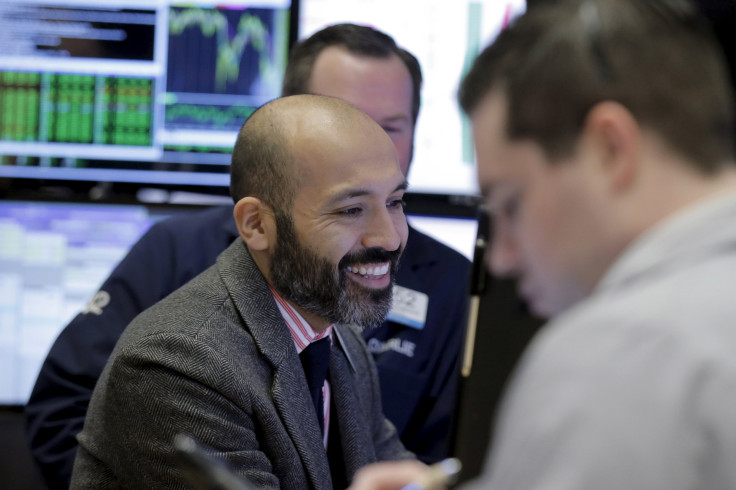Dow Jones Industrial Average Wavers As Oil Prices Drop, But Stocks Are Up For The Week

This story was updated at 4:25 p.m. EST.
U.S. stocks ended the trading week in the green despite a relatively flat Friday after oil prices turned negative. The three main U.S. stock exchanges advanced between 2 and 4 percent over the four-day trading week following Monday’s Presidents Day holiday and a three-day rally that began last Friday.
"[We’re] seeing a little bit of a pause from the extremes that we've been put through over the past several weeks," Eric Wiegand, senior portfolio manager at the Private Client Reserve at U.S. Bank in New York, told Reuters. "We're still anxious to get confirmation of growth and stability."
Stocks have been following crude prices for much of the year as investors use oil demand as a signal of global economic conditions.
The Dow Jones Industrial Average (INDEXDJX:.DJI) closed down 21.44 points, or 0.13 percent on Friday, to 16,391.99, but gained 2.59 percent over the four-day trading week. (Monday was a federal holiday.) The broader Standard & Poor's 500 index (INDEXSP:.INX) closed almost where it began the day, to 1,917.78. The S&P gained 2.84 percent this week. The Nasdaq composite (INDEXNASDAQ:.IXIC) gained a slight 16.89 points, or 0.38 percent, and gained 3.85 percent for the week.
The Dow and S&P are down about 6 percent this year while the Nasdaq has dropped about 10 percent.
Six of the10 S&P 500 sectors closed down Friday afternoon, with materials stocks shedding about 1 percent. Home Depot Inc. (NYSE:HD) and Nike Inc. (NYSE:NKE) led Dow gains while Intel Corporation (NASDAQ:INTC) and Boeing Co. (NYSE:BA) led declines.
The U.S. Labor Department said Friday that inflation rose in January by the most since August 2011, by 0.3 percent. The 12-month total through January was 2.2 percent, the highest annualized rate since June 2012.
"Broad-based price growth is signaling that the wage and price pressures are building, an indication that the economy is expanding at a solid pace and that recessionary concerns are overdone," Gus Faucher, senior macroeconomist for PNC Financial Services Group, said in a note to investors.
The inflation rate is being closely monitored by the U.S. Federal Reserve and the latest figure increases the likelihood of short-term borrowing rate increases this year. A higher rate would indicate that the Fed believes the U.S. economy is strong enough to return borrowing costs to normal levels. Increasing the rate puts downward pressure on stocks because it raises corporate borrowing costs and makes bonds, a key alternative to stocks, more attractive to investors.
Safe Harbor Bets
The benchmark U.S. 10-year Treasury yield ticked down to 1.755 percent on Friday after closing Thursday at 1.762. Last week, the yield dipped to its lowest level in nearly a year. The bond yield typically rises when investors are more confident about the markets and falls when concerns flare. The yield rose above 1.8 percent on Wednesday amid a rally in stocks. Gold, another so-called safe harbor investment, edged up 0.21 percent to $1,228.90. Gold prices tend to rise as confidence in the markets falls.
Oil Prices
U.S. crude prices dropped below $30 Friday morning after rising by double digits earlier this week after Saudi Arabia and Russia agreed to freeze output.
U.S. West Texas Intermediate fell 3.28 percent to $29.76 per barrel for March delivery on the New York Mercantile Exchange on Friday morning. Brent crude, the other major global benchmark, lost 3.24 percent to $33.17 for April delivery on the London ICE Futures Exchange.
Global Markets
Asian and European stocks were ending Friday’s session in negative territory.
Japan’s Nikkei 225 closed down 1.42 percent after eking out a slight gain earlier in the day. The market gained nearly 7 percent for the week. Hong Kong’s Hang Seng ended Friday down 0.4 percent, but advanced about 5 percent for the week. The broad Shanghai Shenzhen CSI 300 index of China mainland’s largest companies dropped 0.07 percent on Friday but has gained 3 percent since the closing bell on Feb. 5. (China’s mainland markets were closed last week for the Lunar New Year holiday.)
In Europe, the broad Stoxx Europe 600 index closed Friday down 0.86 percent. The Paris-based CAC 40 lost 0.39 percent while London’s FTSE dropped 0.36 percent. Frankfurt’s DAX was down 0.8 percent.
© Copyright IBTimes 2024. All rights reserved.





















